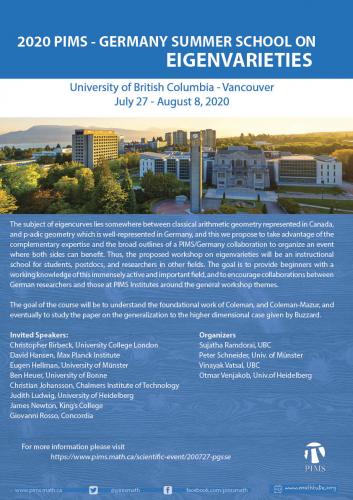2020 PIMS - Germany Summer School on Eigenvarieties (Postponed)
Speakers
Details
Due to the current health crisis and restrictions to movement globally, this event has now been postponed. All confirmed participants will be contacted by the organizers
Non-archimedean geometry is the analogue of complex geometry, where the field of complex numbers is replaced by a field which is complete with respect to a p-adic metric. A fundamental complication is that p-adic spaces are totally disconnected, and therefore basic notions such as analytic continuation must be entirely recast in a different language. Nevertheless, the particular properties of the p-adic topologies, while perverse in some sense, provide the key to a rich, fulfilling, and ultimately productive theory. There are various manifestations of non-archimedean geometry, e.g. rigid analytic spaces `a la Tate, Berkovich spaces or adic spaces `a la Huber. For this summer school we take the point of view of adic spaces with emphasis on rigid analytic spaces which form special examples. Indeed, non-archimedean geometry and the associated area of p-adic Hodge theory for Galois representations play a central role in modern algebraic number theory. It has become increasingly clear that active researchers in algebraic number theory would be greatly benefitted by having a working knowledge of p-adic geometric methods.
Eigencurves - and more generally, eigenvarieties - are rigid analytic versions of modular curves, which parametrize p-adic families of modular forms. The study of such families may be said to have started with Serre in the 1970s, and was extensively developed by Hida in the 1980s; Hida's work on the so-called ordinary modular forms, in particular, was deeply influential in the eventual proof of modularity of elliptic curves by Wiles and others in 1994. However, it was clear even from looking at Serre's results, that a fully satisfactory theory of p-adic families would require consideration of non-ordinary forms, and that such a theory would necessarily require fundamental new ideas. These results were eventually supplied by Coleman in the mid-1990s, and the eigencurve parametrizing was introduced as a parameter space by Coleman and Mazur shortly thereafter. The subject has exploded in the last decades, with generalizations of the eigencurve to higher rank groups, and with the use of increasingly sophisticated technology from p-adic geometry. Furthermore, p-adic families of automorphic forms have taken on an increasingly important role in modern number theory.
The subject of eigencurves lies somewhere between classical arithmetic geometry represented in Canada, and p-adic geometry which is well-represented in Germany, and this we propose to take advantage of the complementary expertise and the broad outlines of a PIMS/Germany collaboration to organize an event where both sides can benefit. Thus, the proposed workshop on eigenvarieties will be an instructional school for students, postdocs, and researchers in other fields. The goal is to provide beginners with a working knowledge of this immensely active and important field, and to encourage collaborations between German researchers and those at PIMS Institutes around the general workshop themes.
Topics of Instruction:
The goal of the course will be to understand the foundational work of Coleman, and Coleman-Mazur, and eventually to study the paper on the generalization to the higher dimensional case given by Buzzard. A good overview of the subject is given in the survey article of Kassei.
Invited Speakers:
Christopher Birbeck, University College London
David Hansen,Max Planck Institute
Eugen Hellman,University of Münster
Ben Heuer, University of Bonne
Christian Johansson, Chalmers Institute of Technology
Judith Ludwig, University of Heidelberg
James Newton,King’s College
Giovanni Rosso,Concordia

